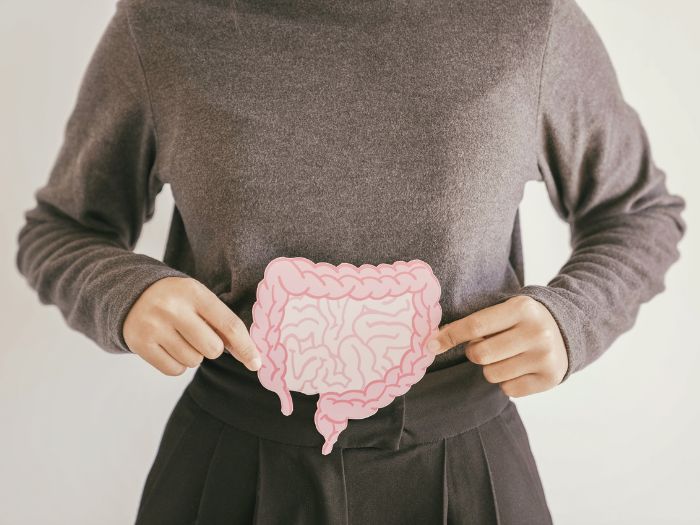June is Bowel Cancer Awareness Month which makes now a great time to get in the know about the disease and make changes to ensure you’re on a path of prevention.
We shed light on Australia’s second deadliest cancer (bowel cancer) and list simple changes you can make with the aim of a healthier future.
Get in the know
What bowel cancer is
Bowel cancer, aka colorectal cancer, is a type of cancer that starts in the colon. It usually begins as small growths called polyps, which can turn into cancer over time.
Having bowel cancer means dealing with a serious disease that can require treatments like surgery or chemotherapy to remove or manage the cancer.
The typical causes
Bowel cancer is often caused by a combination of genetics and lifestyle choices.
Things like a diet high in red and processed meats, low physical activity, and smoking are very common causes.
In terms of genetics, a family history or inherited genetic disorders can increase the chances of developing the disease.
The typical symptoms
- Early stage symptoms: Changes in bowel habits, such as diarrhoea or constipation
- Mid stage symptoms: Blood in the stool or bleeding
- Late stage symptoms: Unexplained weight loss, fatigue, and persistent abdominal pain
Symptoms can vary per person, both in severity and appearance.
Find out more about bowel cancer here.
What the experts recommend
For people at average risk of bowel cancer and without symptoms, Australian medical guidelines recommend screening using a faecal immunochemical test (FIT) every 2 years between ages 45-74.
Get regular screenings starting at age 45, or earlier if you have a family history of bowel cancer or are otherwise at a higher risk, massively helps detect the disease early.
And of course, make better choices to help prevent bowel cancer!
Changes you can make for a healthier bowel
Increase Fibre Intake
Why: A high-fibre diet can lower your risk of developing bowel cancer.
Eating more fruit, vegetables, whole grains and healthy food (we all know what that is) can significantly boost your fibre intake.
Fibre helps keep your digestive system running smoothly and prevents constipation.
Aim for at least 30 grams of fibre daily to support bowel health.
Here are some high-fibre winners:
- Whole grain and multigrain breads
- Nuts and seeds
- Fruit and vegetables
- Oats, brown rice, and quinoa
- Black beans, lentils, and chickpeas
And some losers:
- White bread and white rice
- Processed meat
- Fast food
- Chips, cookies, and frozen meals
Stay Hydrated
Why: Proper hydration is essential for a healthy digestive system.
Drink plenty of water throughout the day to stay hydrated. Water helps fibre do its job by softening stools and promoting regular bowel movements.
Aim for at least 8 cups of water daily and more if it’s hot and/or you do a lot of exercise or physical activity – which you should.
Exercise Regularly
Why: Physical activity reduces the risk of bowel cancer and other digestive issues.
Do at least 30 minutes of moderate physical activity most days of the week. And, don’t blur being ‘busy’ with exercise.
Regular exercise helps stimulate intestinal activity and prevents constipation.
Activities like walking, cycling or swimming can not only improve your overall health, but also work wonders for mood and mental health in general.
Limit red and processed meat
Why: A diet lower in red and processed meats supports better digestive health.
Reduce your intake of red and processed meat, like sausages and bacon.
Instead, go for lean protein sources like chicken and fish. These changes can lower your risk of bowel cancer.
Red meat is considered bad for the bowels because it is often difficult to digest, leading to potential constipation and other digestive issues.
Red meat includes
- Beef
- Lamb
- Pork
- Veal
- Goat
Red meat isn’t only about the colour when you eat it.
Quit Smoking
Why: Smoking harms the bowels by causing inflammation and increasing the chances of diseases like Crohn’s, colitis, and cancer.
If you smoke (or vape), quit. It’s as simple as that. Smoking is linked to an increased risk of bowel cancer and a huge array of other health problems.
Smoking harms various parts of the body, including lungs, heart, blood vessels, skin, eyes, mouth, throat, and as per our topic, the digestive system. This is because the chemicals in cigarette smoke are carcinogenic and can damage cells, cause inflammation and reduce oxygen.
Limit Alcohol Consumption
Why: Excessive alcohol can irritate the digestive system and increase bowel cancer risk.
Try to reduce your alcohol intake: “healthy men and women should drink no more than 10 standard drinks a week and no more than 4 standard drinks on any one day”.
This is according to the National Health and Medical Research Council (NHMRC) guidelines.
If you believe you’re drinking too much, look at what’s causing it and try to replace those events or situations with something that doesn’t involve drinking. For example, an activity instead of the pub.
Get Regular Screenings
Why: Early detection saves lives.
Bowel cancer screenings are, and should be, part of everyone’s health routine at a certain age, or when recommended by professionals.
Screenings can detect early signs of cancer before symptoms appear. This means in the event you have something suspicious, treatment is often much easier, faster, less invasive and less serious than it might be at a later stage.
Talk to us about the appropriate screening tests for you.
Early detection through regular screenings can save lives.
The focus on bowel health is easy to explain
At Well on Bay, we’re huge advocates of all things health and as such, bowel health is a focus.
Bowel cancer awareness, prevention and bowel health in general affect everyone, that’s completely regardless of your gender, lifestyle, beliefs or occupation.
Bowel Cancer Awareness Month puts emphasis on all we’ve covered, especially the parts about early detection and preventative health.
If you’re due for a screening, or suspect you might be, or would like to ensure your overall health is on the right track, get in touch with us.







